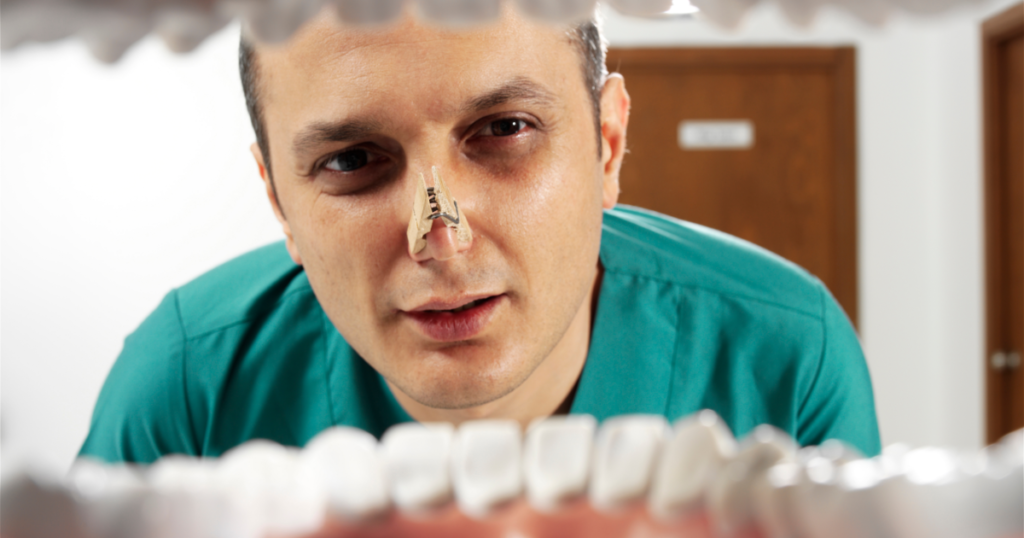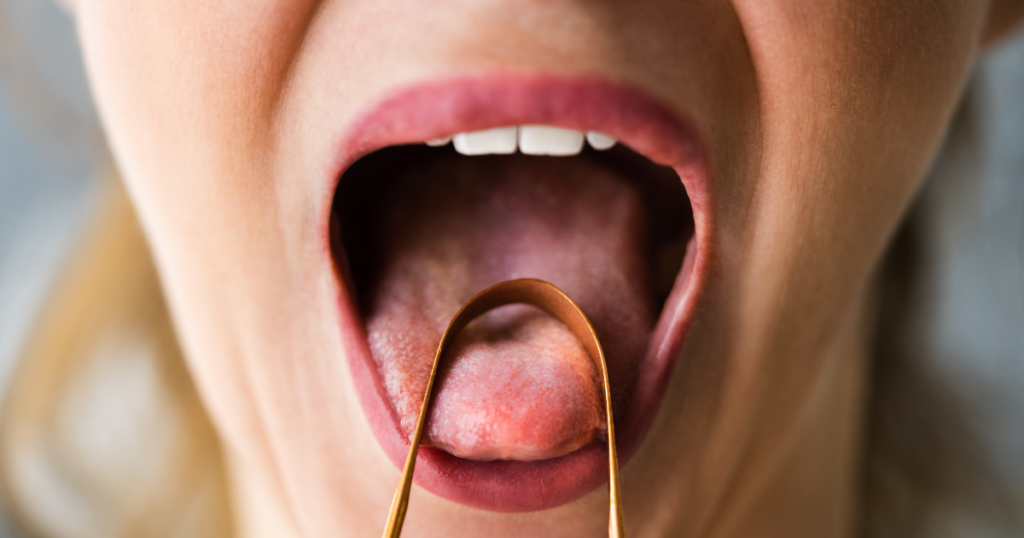Eliminate Bad Breath: Tips and Strategies for Fresh, Odor-Free Mouths
Welcome to this week’s blog post, where we will discuss bad breath and how to eliminate it. Smelly breath, or halitosis, is a common condition that can cause significant embarrassment and discomfort. Imagine being in a social setting, engaging in conversation, only to be met with wrinkled noses and subtle distancing from others due to the unpleasant odors or a foul odor from your mouth. It can be an incredibly distressing experience, shattering your confidence and leaving you feeling self-conscious.
But fear not, for there is hope! Bad breath is not an irreversible or untreatable condition in most cases. Understanding the causes and implementing simple strategies can help improve your breath and restore your social interactions to their glory.

One of the main culprits behind bad breath is poor oral hygiene. When we neglect to brush and floss our teeth regularly, bacteria build up in our mouths, releasing sulfur compounds that lead to foul odors. Therefore, adopting a diligent oral care routine is the first step towards combating bad breath.
Brushing your teeth at least twice a day and using toothpaste can help remove the plaque and bacteria that accumulate on the surface of your teeth and tongue. Remember to pay special attention to your tongue, as it is a cozy breeding ground for odor-causing bacteria. Gently scraping your tongue with a tongue scraper or the back of your toothbrush can make a significant difference.

Conversely, flossing is essential to remove food particles and plaque between your teeth, which your toothbrush cannot reach. Incorporating mouthwash into your routine can also contribute to fresher breath by killing bacteria and temporarily masking any existing odors.
Apart from oral hygiene, certain lifestyle choices can also impact the freshness of your breath. For instance, tobacco use not only stains your teeth but also dries out your mouth and contributes to bad breath, so avoiding tobacco products will help dramatically. Chewing sugarless gum or sucking on sugar-free candies can help stimulate saliva production, reducing dry mouth and keeping your breath fresh.
Now, let’s discuss the elephant in the room: diet. What you eat can have a direct effect on your breath. Foods such as garlic, onions, and certain spices contain volatile compounds that can linger in your mouth and cause malodorous breath. While avoiding these foods may not be practical, being mindful of their impact and taking proactive measures can help.
One easy way to combat foul odors is to start your day with a refreshing glass of water. Drinking plenty of water throughout the day and staying hydrated with enough water not only has excellent overall health benefits but also maintains adequate saliva production, which acts as a natural mouth cleanser. Avoiding excessive alcohol consumption and limiting your intake of sugary beverages can also contribute to better breath.
Sometimes, bad breath can indicate underlying health conditions, such as gum disease, sinus infections, or gastrointestinal disorders. If you have consistently tried the measures mentioned in this blog with no significant improvement, it is advisable to consult a healthcare professional to rule out any potential systemic causes.
Discover Natural Solutions for Fresher Breath and Regain Your Confidence
Natural remedies for bad breath can be simple and effective. Known for their antibacterial properties, incorporating essential oil into a homemade mouthwash can help kill bad bacteria and freshen your breath. Additionally, rinsing your mouth with a cup of water mixed with a teaspoon of salt and a tablespoon of apple cider vinegar can balance pH levels and reduce the growth of bacteria causing bad breath. Regular dental care, including brushing, flossing, and dental checkups, is crucial for maintaining oral health and preventing chronic bad breath. By addressing the root cause of bad breath with natural solutions, you can enjoy a healthier mouth and fresher breath in the first place.

In conclusion, bad breath, or halitosis, is not a life sentence. By prioritizing good oral hygiene, making mindful lifestyle choices, and seeking professional guidance when necessary, especially if you have periodontal disease, you can regain your confidence and bid farewell to the discomfort and embarrassment that bad breath brings. Remember, fresh breath is within your reach!
In this post, we will provide some home remedies for treating bad breath and preventing it from coming back. All the information provided in this post is supported by scientific evidence, so you can trust the advice given.
Tip #1: Use sugar-free gum or mints
One of the easiest and immediate fixes for bad breath is to use sugar-free gum or mints. These products can help mask the smell and stimulate saliva production, which can help eliminate food particles that may be causing bad breath. Look for ingredients like xylitol, which has been shown to stimulate saliva production.
Tip #2: Use an antibacterial mouthwash
Using an antibacterial mouthwash can also help eliminate bad breath. Look for mouthwashes containing chlorhexidine, hydrogen peroxide, or zinc. These ingredients can help protect your gums, reduce the risk of gum disease, and kill off bacteria that cause bad breath. Make sure to choose an alcohol-free mouthwash to avoid potential side effects like tooth discoloration and reduced saliva production.
Tip #3: Brush your teeth and scrape your tongue
Brushing your teeth and scraping your tongue can provide an immediate fix for bad breath. Studies have shown that brushing your teeth, followed by tongue scraping, can significantly reduce bad breath by up to 70%. The tongue contains the most bacteria, which can cause bad breath, so it’s important to incorporate tongue cleaning into your oral hygiene routine.
Tip #4: Avoid foul-smelling foods
Certain foods like garlic, onions, coffee, dairy, and canned fish can contribute to bad breath. These foods contain sulfuric compounds or create favorable environments for bacteria in the mouth. While you don’t have to completely eliminate these foods from your diet, it’s important to be mindful of when and how often you consume them to minimize their impact on your breath.
Tip #5: Reduce sugar consumption
Reducing your sugar consumption can help prevent bad breath. Bacteria in the mouth feed on sugar, leading to increased bacterial growth and bad breath. Avoid sugary drinks, snacks, and foods to maintain a healthier oral environment.
In addition to these tips, it’s essential to maintain good oral hygiene by brushing your teeth twice a day, flossing, and seeing your dentist regularly. Quitting smoking and seeking professional help if bad breath persists despite following these tips are also important steps to take.
In Conclusion
Remember, bad breath can be a common issue, but with proper care and attention, you can have fresh breath and improved oral health. We hope you found these tips helpful. If you have any additional tips or experiences to share, please leave a comment below. Stay awesome, and we’ll see you next time!
Do you feel better about your breath now?
